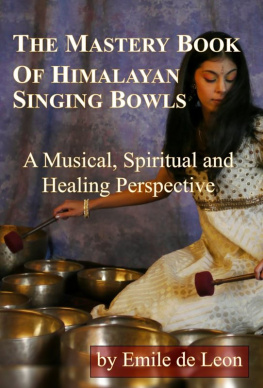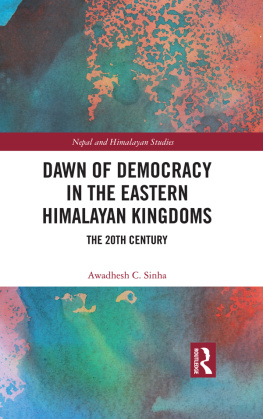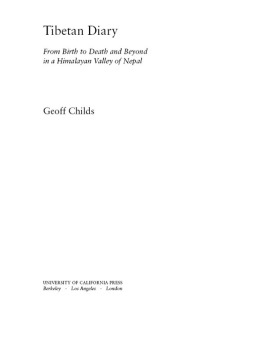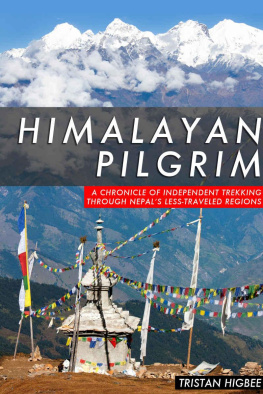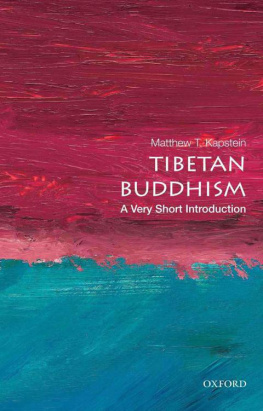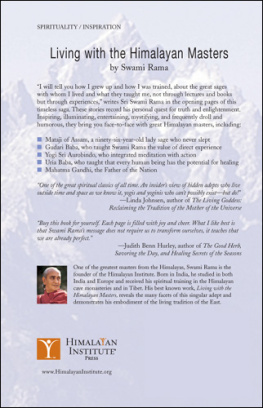HIMALAYAN PASSAGES
Studies in Indian and Tibetan Buddhism
THIS SERIES WAS CONCEIVED to provide a forum for publishing outstanding new contributions to scholarship on Indian and Tibetan Buddhism and also to make accessible seminal research not widely known outside a narrow specialist audience, including translations of appropriate monographs and collections of articles from other languages. The series strives to shed light on the Indic Buddhist traditions by exposing them to historical-critical inquiry, illuminating through contextualization and analysis these traditions unique heritage and the significance of their contribution to the worlds religious and philosophical achievements.
Members of the Editorial Board:
Tom Tillemans (co-chair), University of Lausanne
Jos Cabezn (co-chair), University of California, Santa Barbara
Georges Dreyfus, Williams College, Massachusetts
Janet Gyatso, Harvard University
Paul Harrison, Stanford University
Toni Huber, Humboldt University, Berlin
Shoryu Katsura, Ryukoku University, Kyoto
Thupten Jinpa Langri, Institute of Tibetan Classics, Montreal
Frank Reynolds, Emeritus, University of Chicago
Cristina Scherrer-Schaub, University of Lausanne
Ernst Steinkellner, University of Vienna
Leonard van der Kuijp, Harvard University

With contributions from
Franz-Karl Ehrhard
Alexander von Rospatt
Andrew Quintman
Donald S. Lopez Jr.
Leonard W. J. van der Kuijp
Ernst Steinkellner
Jacob P. Dalton
Sarah H. Jacoby
Iain Sinclair
Anne Vergati
Kabir Mansingh Heimsath
Punya Prasad Parajuli
Dominique Townsend
Benjamin Bogin
Explore compelling new research on Nepal and Tibet from leading voices of Himalayan Buddhist studies.

Reflects the wide range of texts, traditions, and insights that Hubert Decleer has creatively pursued as a ground-breaking and original researcher.
T ODD L EWIS , author of Popular Buddhist Texts from Nepal
Himalayan Passages is a narrative tapestry of the worlds Hubert Decleer has shared with and opened up for many generations of scholars past, present, and future. A remarkable achievement.
S IENNA R. C RAIG , chair, Department of Anthropology, Dartmouth College
Hubert Decleers scholarship placed an emphasis on place and especially holy places long before it became a popular theme, but also place in a deeper sense, including the more intimate interior spaces, combining the macro- and micro-cosms in a manner not unreminiscent of the tantric body mandala. We see much of that here, in the work of his students and colleagues, in true humanist style taking part in their subject of study, keeping it alive.
D AN M ARTIN , author of Tibetan Histories
The best new scholarship on the Himalayas, fitting homage to the finest mentor in Himalayan studies who has inspired generations of scholars to explore, to study, and to love this part of the world.
K URTIS R. S CHAEFFER , chair, Religious Studies Department, University of Virginia
B ENJAMIN B OGIN is assistant professor of Buddhist studies in the Theology Department at Georgetown University and the author of The Illuminated Life of the Great Yolmowa (2013).
A NDREW Q UINTMAN is assistant professor in the Department of Religious Studies at Yale University. He is the author The Yogin and the Madman (2013), and his English translation of The Life of Milarepa is part of the Penguin Classics series.
Contents
Publishers Acknowledgment
THE PUBLISHER gratefully acknowledges the generous contribution of the Hershey Family Foundation toward the publication of this book.

Participants in the International Seminar of Young Tibetologists in Zurich, 1977.
First row, left to right: Ricardo O. Canzio, Eva Neumaier, Per Kvaerne, Elena De Rossi Filibeck, Martin Kalff, Margaret Nowak, Michael Hahn, Ramon Prats, Per-Arne Berglie, Martin Brauen. Second row: unknown, Jampa L. Panglung Rinpoche, Hubert Decleer, Ronald H. Poelmeijer, Tarab Tulku N. Losang, Geshe Lobsang Dargyay, Helga Uebach. Third row: unknown, Veronika Ronge, Claes Corlin, Franz-Karl Ehrhard, Leonard van der Kuijp, Helmut Eimer, Michael Aris

Hubert (center) at the 1977 seminar.
(Photos courtesy of Leonard van der Kuijp.)
T HE ESSAYS in this volume celebrating the contributions of Hubert Decleer had their genesis in a panel of presentations at the Twelfth Seminar of the International Association for Tibetan Studies held in Vancouver in 2010. The conference fortuitously coincided with Huberts seventieth birthday; it also marked the twenty-second anniversary of the School for International Trainings Tibetan Studies program. The panel was meant, in part, to recognize Huberts influence on the new generation of scholars in the fields of Tibetan and Himalayan Studies. The presenters therefore comprised a cohort of his former students, alumni representing the programs two decades in the region: Andrew Quintman (spring 1988), Jacob Dalton (spring 1989), Kabir Mansingh Heimsath (spring 1989), Eric Mortensen (fall 1991), Benjamin Bogin (fall 1993), and Dominique Townsend (spring 2000). Five of these papers, as well as a contribution by program alumna Sarah Jacoby (spring 1995), appear here, together with essays by eight of Huberts colleagues in North America, Europe, and Asia representing more senior voices in the field.
We are delighted to have an opportunity to acknowledge and celebrate the diverse range of Huberts achievements. We celebrate his work as a study-abroad academic director that shattered the limited worldview of nearly one thousand undergraduate college students and introduced many of us to the cultures we have come to love. We celebrate his work as a scholar who has taught us much about the religious, literary, musical, and artistic traditions of the Himalaya as well as the pop cultures of Europe and North America. We celebrate his work as a mentor who inspired many of us to return to Asia when we finished college, to enter graduate programs in fields as varied as Anthropology, Art History, Development Studies, History, Philosophy, Public Policy, and Religious Studies. We celebrate his work as a colleague for those of us who were fortunate to work alongside Hubert over the years as codirectors of the SIT Tibetan Studies program and for those who have continued in other related fields in academia, study abroad, nonprofit and public service, the fine arts, and even business and philanthropy in Asia. And finally, we celebrate his work (if you can call it that) as a friend who regularly shared daal bhaat at his dining table or coffee on his terrace overlooking the Svayambh mahcaitya. His home was a legendary oasis for scholars, former students, artists, and musicians passing through or residing in Nepal, filled with conversation that never failed to make us think about the world in new ways. We are happy to have an opportunity to celebrate the work Hubert has done and to thank him for it.
A Note on Transliteration and Phonetics
Next page

